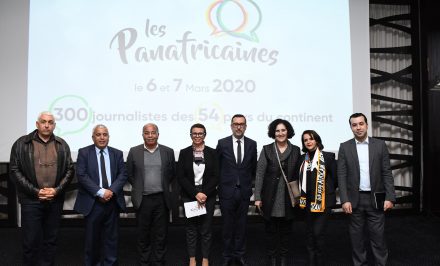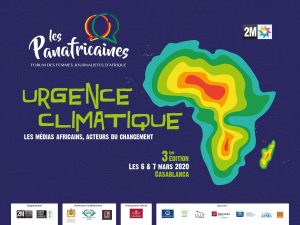 Cameroon : Dr. Yasmine Ndassa, the research scientist turned data storyteller
Cameroon : Dr. Yasmine Ndassa, the research scientist turned data storyteller
 Julien Ngum Che : advocating for the rights of displaced women and youth in Cameroon
Julien Ngum Che : advocating for the rights of displaced women and youth in Cameroon
 Chilufya Mutale Mwila, the Zambian entrepreneur driving financial inclusion across Africa
Chilufya Mutale Mwila, the Zambian entrepreneur driving financial inclusion across Africa
 Wangari Muchiri, the Kenyan engineer committed to accelerating the ecological transition in Africa
Wangari Muchiri, the Kenyan engineer committed to accelerating the ecological transition in Africa


The third edition of «Les Panafricaines» Forum will take place on March 6 and 7, 2020 in Casablanca under the theme « Climate emergency, African media actors of change».
Initiated by the 2M, and carried by Radio 2M and the Parity and Diversity Committee, this network aims to contribute to a public awareness of the responsibility of the media and their role in building opinion in African societies , through the creation of a long-term collaborative platform and exchange bridges between professionals from the continental press.
2020, a Forum around a strong theme
Climate change is a crucial issue for the African continent, to the point of determining its development, and therefore its future, for the coming decades. Africa must therefore today negotiate a decisive turning point. From the evolution of weather conditions, which has effects on agricultural and food production, to the rise in sea levels, which increases the risks of foods, the consequences of climate change are global in terms of effects. Without immediate action, it will be much more difficult and costly for Africans to adapt to the future consequences of these changes.
Africa, which contributes less than 4% of global greenhouse gas (GHG) emissions, is the first victim of climate change. Of the 10 countries in the world considered most threatened by global warming, 7 are African: Sierra Leone, South Sudan, Nigeria, Chad, Ethiopia, the Central African Republic and Eritrea. The Intergovernmental Panel on Climate Change believes that climate change and natural disasters like droughts and foods are slowing the development of the African continent. Fluctuations in agricultural production, as well as inefficient farming systems, cause food insecurity, one of the most obvious indicators of poverty.
In the absence of urgent action to reduce global emissions, the frequency of climate shocks and stresses is expected to increase significantly in Africa. Therefore, the sooner governments join the renewable energy revolution and work to protect communities at risk, the more lives and lives saved.
In his message to the participants in the 8th Islamic Conference of Ministers of the Environment, on October 2, 2019, HM King Mohamed VI underlined: “The issues pertaining to the environment and to sustainable development are among the major challenges the world is facing today. Many international studies point to an unprecedented depletion of natural resources, to a dramatic rise in pollution levels as well as to a major disruption of the global environmental balance. This situation has serious and alarming consequences for our planet today, including evident adverse impacts on the economic, social and health situation.
It means there are inexorable risks for all the countries of the world, especially vulnerable ones. Pressing environmental problems and their negative effects – on which political and geographical borders have no bearing – can be tackled only through close cooperation between States. Whatever its capabilities, no single country can effectively address these problems on its own ».
The role of the media

According to the Intergovernmental Panel on Climate Change, the planet would remain 10 to 15 years to transition to a less predatory civilization. Understanding and accepting such rapid change is not possible without the media. Faced with the gravity of the consequences of climate change, African journalists therefore have no choice but to adopt the role of «proactive media», allowing well-informed citizens to act at their level, but also to influence their leaders.
The media is an important source of information, which can empower people and push them to make positive changes. They can inform vulnerable communities about the impacts and how they can adapt to them, and promote mitigation activities that aim to limit the number of actions leading to global warming. Quality media coverage on climate change issues can lead not only to better informing the public, but also to better informing decision-makers and developing more effective policies.
Effective media coverage can also help raise global awareness of the challenges facing less-developed nations, as well as promote a lasting outcome in intergovernmental climate change negotiations. This is why the role that the Pan-African network can play in this issue is very important.
It is therefore a question for Les Panafricaines of subscribing to this desire to inform, influence, educate and alert, in order to promote the resilience of African societies to the impacts of climate change.
The 3rd edition of the Pan-African Forum will take place over 2 days, on March 6 and 7, 2020 in Casablanca. The first day will be devoted to debates, exchanges and workshops around the central theme. The second day will be devoted to the development of the action plan which will be deployed over the current year.
WORKSHOP 1
« Succeeding in Africa’s energy transition: issues and challenges »
Expert / Supporter: Abderrahim KSIRI, National Coordinator of the Climate and Sustainable Development Alliance.
WORKSHOP 2
« The challenges of rational management of water resources »
Expert / Coach: Professor Fouad AMRAOUI, Teacher-Researcher, President of the Association for Research Action for Sustainable Development.
WORKSHOP 3
« Sustainable agriculture: a green economy for Africa »
Expert / Supporter: Fettouma DJERRARI BENABDENBI, co-founder of the «Earth and Humanism in Morocco» Movement for agro-ecology
WORKSHOP 4
« Health impact of climate change, which strategy to adopt? »
Expert / Supporter: Rachid WAHABI, Head of the Environmental Health Division, Ministry of Health.
WORKSHOP 5
« What sustainable development for African cities ? »
Expert / Supporter: Mohamed NBOU – Special Advisor to the Secretary General of United Cities and Local Governments of Africa, member of the Africa Climate Task Force.
WORKSHOP 6
« Waste management, a decisive lever in the fight against climate change »
Expert / Supporter: Ana LE ROCHA (Tanzania), Executive Director of the «Nipe Fagio» Organization, which carries out actions with the private and public sector for the promotion of sustainable development.
WORKSHOP 7
« Adaptation to climate change, the media actors of change »